#tradition of occult and history etc
Photo

Hope you have had a nice start of September! From a celebratory point of view, I have discovered that September (called syyskuu “autumn month” in Finnish) sucks around here! There are no major celebrations on September around here, so I had to go in with some less ubiquitous one.
Michaelmas, or the feast of Saint Michael, is generally celebrated as a memorial day of all angels in the Church of Finland. In some regions, Michaelmas would also include traditions attributed with the harvest festival.
I decided to make this fanart about two canonically Christian characters, Roberto and Hiraga from Vatican Miracle Examiner. This definitely suits their clerical lifestyle. The stained glass is based on actual piece of arcitechture in Finland.
This piece is part of my fanart series depicting Finnish holidays and celebrations around the calendar year.
#vatican miracle examiner#Vatican Kiseki Chousakan#as a fun fact I have a MTh with major in religious arts#though my thesis was about music and lyrics mostly#but I have some expertise in christian symbolism etc#so doing this was nice because#I often feel at home when looking at church architecture etc because thats what I did in school#anyway VME is kind of frustating show to watch from my viewpoint because I keep thinking that this could lift so much more from the rich#tradition of occult and history etc
9 notes
·
View notes
Text
How to learn real astrology: what it is and is not
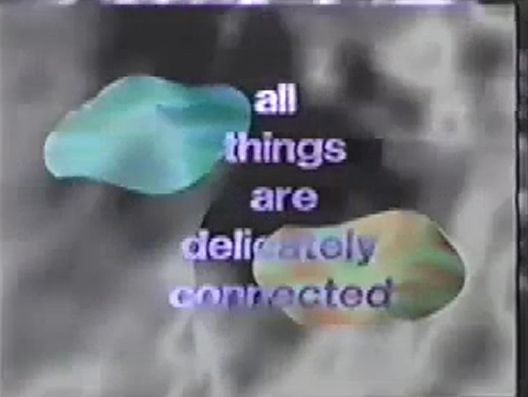
As above, so below, as within, so without, as the universe, so the soul.

It is VITAL that if you want to understand astrology properly, you come in with an open mind and forget everything you think you know. Especially, remove yoruself from the belief that astrology is some occultic mystical spiritual practice, and/or that it is solely some psychological tool.
I used to be quite the hater of astrology. None of it 'resonated', and it seemed like wishy washy hippie shit. In lockdown, astrology stuff kept coming onto my feed, and some of it made sense, but most still did not. I then initially wanted to debunk astrology. But when I properly stated looking into it, the deeper I went the more accurate it started to become. Equally, parts still remained highly inaccurate. But this was due to a mismatch of how 'influencers' out there synthesised and understood the traditional foundations of astrology and modern information. Thus, I committed myself to truly understanding astrology, and my life has significantly improved for it and I've only just started.
As an introductory post to what astrology really is, I have formatted it into the following sections:
i. the problem with pop culture astrology, ii, the history of astrology, iii. how astrology works, and iv. where meaning in astrology comes from.

The problem with pop culture astrology
This is the type of astrology we see in newspaper horoscopes, online articles, tiktok viral posts, instagram horoscopes, etc.
This is borne out of the allure astrology holds for desperate individuals seeking an easy and quick answer to their life problems, and using it as a form of confirmation bias for hating their ex (for example). But this misuse of astrology will undoubtedly hit for most people, due to the barnum effect, but is ultimately inaccurate and those who think it true have now misleadingly correlated the pop culture reasons for why X happened to what astrology is.
The new moon in your 7th house is not a sign that your crush will leave his partner for you. Being a gemini sun does not mean you are a two faced, loyal-less individual. Having your sun sign the same as their venus sign does not mean you two are compatible. And so on and so forth.
Here are some key things to understand about astrology:
✎ Stop using co-star, and those websites which give you your astrology information like this:

-> This does not tell you anything remotely significant aside from standard archetypal and superifical meanings of having a sun in Sagittarius or whatever (which you might not even 'relate' to, because of a multitude of other factors this does not show). Your chart instead, should, at the very least look like this:
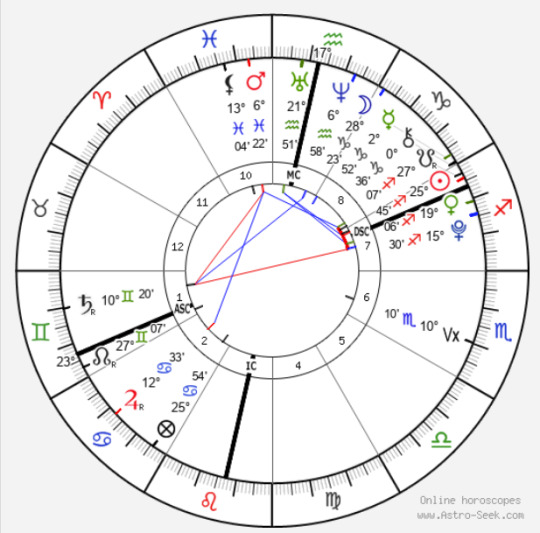
-> Even better, make a chart and add in decans, asteroids, and considers more aspects. Viewing your birth chart like this is essential for gaining a better understanding. Aspects are what brings everything in your chart together to give it more significant and individualised meaning, the houses and the angles are also explicitly identifiable this way. Also, always make sure your chart is in whole sign houses, I will make a post on this later on why, but you will have to go to settings for this as popculture astrology has made placidus the default (as well as other inaccurate takes).
✎ Sun sign is astrology is fake, no matter how much you think it resonates with you it is the wrong footing to base your understanding of astrology off of. Astrology is extremely complex, one thing might resonate for one person and not for another, because of house placements, condition of the planet, aspects to the planet, etc. Consequently, all basic and simplified delineations of a chart are unhelpful and will put you on the wrong footing for future proper readings you might wish to do. This is how astrology can be so inaccurate.
✎ Astrology is not about resonating. Although, this is a part of how we can test astrology, it is linked far too much with resonating with personality. Your birth chart is not a map of who you are specifically, we evolve all the time (as the universe, so the soul), it is a map of your entire life. It is a map of the sky and its energies the minute you were born. Some things you think you do not resonate with is because those energies have not yet played out in your life.
✎ Astrology is not a psychological tool, although it can give us insight into psychology when used and understood properly. Again, it is the blueprint of our life.
✎ Astrology is not spiritual. It is not a belief system, either. Although, one can use astrology to advance their spiritual practices.
✎ Free will exists. I will likely go into this in another post but the energies of our bith chart, solar return chart, profection year, progressed charts, transits etc, are merely indications of how things are likely to unfold. The energies are malleable within their themes' ambit, and it is up to us to decide how we choose to interpret what is/will happen and what to do with that information. A transit might indicate difficulty in a law suit, ok, how can I mitigate that then? What other charts, energies, and transits can I use? If I did not know of this then I would not know how to alter my behaviour to yield a better results, even if it might not mean a completely opposite result.
✎ Your natal chart will not show you everything. There are relocated charts, progressed charts, solar return charts, profection years, etc. All this goes into a holistic assessment. Your natal chart, however, will always remain the anchor of it all.
A brief history
Astrology is not some woo-woo, spiritual, new age, belief system. Astrology's history and use goes back to the Babylonians. It used to be intertwined with astronomy; Galielo and Kepler, for example, were simultaneously astrologers and practised it widely (even as court astrologers). People in positions of power have always consulted astrologers to time events, in the modern era many Royal families, celebrities, and politicans still consult astrologers. Carl Jung, JP Morgan, Nancy Reagan, and Roosevelt are examples of this. Of course, it might be argued that just because famous people have used/use astrology does not give it any more credit to which I say: ok please read my post below pls and ty xo.
Astrology's history has been relatively tumultuous, however. I have condensed this timeline from an article I found below:
- Astrology was a widely accepted practice but, in Europe, after the fall of the Roman empire and much of Europe, it fell into decline along with other disicplines.
- The middle ages saw a renaissance of intellectualism with a particular focus on science and thus the astronomy part of it. This was largely due to the Church who viewed astrology as divination and going against free will.
- However, in other parts of the world astrology was still a crucial element of daily life, and those in power would use astrologers to time events.
- Astrology did re-enter the curriculum, though, in the 14th century, with a focus on being used for medical astrology in part due to the recently available Hippocratic Corpus. These texts were crucial to advancing our understanding of medicine, but Hippocrates emphasised that "a physician without knowledge of astrology has no right to call himself a physician". Astrologer still had a healthy dose of criticism back then, though.
- Astrology was a major field of study in universities in Europe, well ingrained in daily life.
- It died out in the 17th century, mostly due to the increasing emphasis on science being increasingly and misleadingly viewed as separate from astrology, the church, and astrologers falling into disrepute due to political involvement.
- Its resurgence in the 19th century saw an oversimplified, and largely 'spiritualised' version of astrologer. This is because this period also saw an increased interest in the occult and mystic.
- Since becoming conflated, astrology has become even further diluted, but this is not to say that every new discovery has been wrong; modern interpretation is crucial to informing the bigger picture of astrology and how we can utilise it. But it is vital to be critical and separate it from pop culture nonsense, aimed at lost and desperate people looking for quick answers and confirmation bias, and have some media literacy.
So, how does astrology work?
: ̗̀➛ Astrology has NOTHING to do with the physical constellations. Astrology is based on the signs on the ecliptic (the path of the sun amongst the constellations, which is the plane of the earth's orbit).
: ̗̀➛ The equator has 15 constellations, and the ecliptic has 13. So why do we have 12 zodiac signs? This is because babylonians divided the ecliptic into 12 equal segments of 30 degrees each thousands of years ago. The ecliptic was divided into SIGNS. 12 constellations were just used to identify where in the sky each sign would be, at the time for ease of astronomical mapping/calculation - it is merely symbolic. This is why Opphiuchus is not the 13th Zodiac SIGN, although it is a constellation (and has always been known).
: ̗̀➛ Another reason why they are not based off the physical constellations is because the actual size of the constellations vary massively in size. Below is a representation of this:
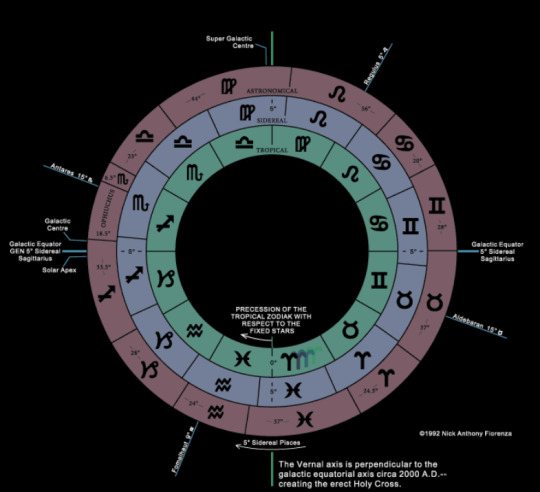
: ̗̀➛ As you can see, Virgo, for instance is huge, and on a literal view overlaps into the next segment because the constellations do not all equally fit a 30 degree division. Yet, we do not give scorpio like 5 days for its season, because the physical constellation does not dictate anything meaningful.
This gives us the tropical zodiac, which is to do with the earth's seasons:
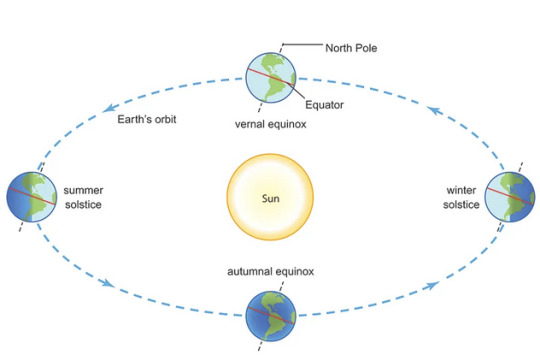
: ̗̀➛ The solstices are therefore reference points for Capricorn and Cancer (tropic of capricorn and tropic of cancer), not the constellations themselves. Accordingly, the spring equinox is marked by Aries (with the sun entering the segment of Aries at 0 degrees until 29), and the autumn equinox by Libra.
: ̗̀➛ The precession of the equinoxes, are therefore irrelevant to astrology (and this is why vedic/sidereal is, in my opinion inaccurate). The slow change of the direction of the earth's axial tilt, over around 26000 years, cause a precession of the equinoxes. This means, the segment of the sky that used to be identified by the Aries constellation from the earth's position at the time, is now looking at Pisces. But as we know, astrology has nothing to do with the physical location of the constellations. Vedic astrologers use sidereal positioning, aka taking into account the precession of the equinoxes, yet they still divide the ecliptic in the same way. This causes problems, leading to many branches in vedic because few agree on where aries actually even starts. But, I will write an extension of this segment in a future post on tropical vs vedic/sidereal astrology.
Where does astrological meaning come from?
As explained above, constellations do not give us meaning, the planets in the signs do (of which the signs' names just derive from where the constellations were at the time, i.e. are merely symbolic).
Astrology operates in a heliocentric context, in that its setting is derived from the solstices (as the sun is what gives us life) and the ecliptic etc, but is geocentric in function in that the meaning comes from how the celestial bodies going through the signs affect us on earth; it is all about OUR relation to the planets, not constellations.
Returning to the quote above (as above so below...), what happens up up there reflects its energies down on us below. For thousands of millenia, astrologers have developed an accurate pattern recognition framework which aligns with the maths and astronomy. This was done using the ephemeris, which tracked the trajectory of celestial bodies against the context of worldly (mundane), or natal events. Eventually, this knowledge could be used for predictions, (to understand transits, or for electional and horary astrology), by utilising the knowledge of how the trajectories of the planets and their interactions with eachother in what sign and house affected what.
Why does it affect us? Well, all the things that happen above us radiate energies. But when I talk about energies, I do not mean it in some spiritual sense, it is quite literal. Everything has frequencies. As mentioned above, astrologers, since the Bablyonian times, have studied these patterns and created an objective framework to align with it. Physical energies or not there is direct causation. The moon for instance, affects the tides on the planet because of its gravitational pull. We are 70% water, there is little reason to deny that the moon cannot affect us either (it does). Perhaps you might understand your broken leg as because of being hit by a car. But astrology can assess the chart of the event, and transits to your own chart to provide further explanation of why you got hit by a car in the first place, and why it caused a broken leg etc.
Subsequently, the energies of what happens above relate to the themes found in planets, signs, houses, aspects, asteroids etc - but these energies are not set in stone as explained above.
Ultimately, it is disappointingly small-minded to think that there is nothing 'greater' than the physical reality we tether ourselves to. We are in fact part of something bigger; and again I do not mean this in some culty spiritual hippy sense. It is literally a fact, the world and cosmos at large is so vast, mysterious, and beautiful, how could anyone deny the interconnected web we are all collectively a part of. We might never fully understand the mechanisms of the universe, but what we can do is use the information we do have to make use of it and help inform us on how to live better lives.
The fact there is something 'greater' inherent in our lives, connecting everything, which is objectively difficult to truly grasp, is not a reason to reject it. A lot of people who are averse to astrology (which used to be me) are those who pride themselves on rationality and objectivity, yet are restricting themselves to a very particular interpretation of what rationality and objectivity means.

With all this said, I hope it has helped someone understand and appreciate astrology better. There is such a fascinating rich and deep history to it, spanning various cultures and eras, making it difficult to at least not enjoy learning about even if one still chooses to not practise it.
I would like to reiterate, however, that to truly embrace astrology and its millenia of knowledge, evidence, and practice behind it, one must divorce its concept from pop culture astrology.

#astrology#introduction to astrology#vedic astrology#western astrology#tropical astrology#astroblr#whole signs#astronomy#aries#taurus#gemini#cancer#leo#virgo#liba#scorpio#sagittarius#capricorn#aquarius#pisces#1st house#4th house#5th house#7th house#8th house#12th house#astrology observations#astro notes#astro community
111 notes
·
View notes
Note
Could you write some headcannons for komodo
Komodo headcanons, lemme see…
Canon he has a tongue split, multiple piercings, and is dating Dragon. I wouldn’t be surprised if he has the same tattoo that Dragon does, just somewhere you can’t see, like on his leg
The one who came up with their names
Appreciates tradition, the older the ritual/lore/tradition the better -history buff-
Sadist/Masochist, and wants to bestow the pleasure he gets from it onto others
Despite being in a relationship, he gives me incel vibes-he’s suffered and wants others to feel the same
Not saying that Dragon’s naive or easily manipulated, but Komodo definitely takes advantage of him, and is the ring leader of the two
He’s likely the one who prompted the desert trips in the first place, as it’s canon he’s the one who got them into the occult
He met Dragon through their work, and then went on to join the desert group with him
Enjoys reading, video essays, documentaries, etc
Made his necklace, and enjoys making things like it, especially while watching/listening to something
Obscure/underground taste in everything, especially music and other media
Thinks he was “born in the wrong generation” because he’s so underground
Not so much of a rave/concert/event guy, but will go if Dragon wants him to
#the price of flesh#boyfriend to death#tpof komodo#tpof dragon#tpof desert group#tpof headcanon#Komodo headcanon#tpof fanfic
79 notes
·
View notes
Note
Hi CT! Big fan of your work, recently started my Master of Arts in History with a concentration on the occult revival in the 19th century (focused on France and England, even more specifically on just hermetic and gnostic traditions) and lowkey thanks to you for the inspiration. There aren't really any academic circles of occult historians that I'm able to find, just smaller splinter grounds of Victorian England historians etc. Are there any professorial organizations of occult historians out there you know of? I'd imagine not since it's such an emergent field in history but you are more versed in this than I. Thank you!
Well first off that's pretty incredible!
Second off, I'm afraid I don't really know of anything of the sort.
98 notes
·
View notes
Text
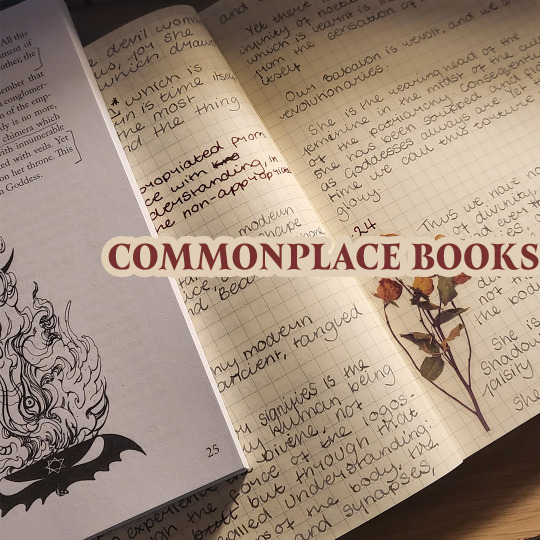
What is a commonplace book
Commonplace books are a method of compiling knowledge into one place, traditionally by handwriting but more recently with computers/word processors. They’re different from journals in that rather than containing exclusively personal thoughts or feelings, they’re a collection of external writings, informations, or other snippets of things recorded whenever it is encountered + usually organised.
To simplify – a commonplace book contains anything that captured it’s owners attention! Poems, extracts of fiction & non fiction writings, remarks or comments by others, anecdotes, observations, pertinent images, or other things along the same lines are all things that belong in a commonplace book!
Commonplace books have quite the history – their uses range between reading logs, reference books for students, and historically they were required by young women to demonstrate their upbringing.
How do they work
The exact system you use in your commonplace book is entirely up to you and what you will remember to use. Usually information is organised under themed/topic-based headings, but this can be as flexible or stiff as the keeper desires. My personal commonplace book is organised by source material – all of my book extracts & notes are kept together and demarcated by paperclips.
A commonplace book has no requirements in terms of physical format, size, page type, etc. As long as it is something you will be able to keep using happily! There is also no rules around decorating any pages with stickers or washi tape, or any rules around using sticky notes to add information on the go.
A commonplace book can also be as expansive or restricted as possible in terms of subject matter. For example, I keep a specific commonplace book for Babalon & Sekhmet. Nothing else enters this book.
What’s their use in religious practice or witchcraft?
A commonplace book can function as an in-between for a Grimoire (a book of magical knowledge and instruction, usually written by someone else and usually for transmitting knowledge within a specific tradition or branch of religion/witchcraft) & a Witchbook/Book of Shadows (more akin to a magical/religious journal for recordkeeping). They’re also exceptionally useful if you read a lot of metaphysical, occult or spiritual/religious books and want to keep organised notes in a hard copy form!
Commonplace books can be used to record interesting information from other, non-metaphysical but useful sources too, foraging notes and recipes are an obvious choice to keep a record of, along with notes about celestial events from astronomy sources.
In some cases, a commonplace book can also be a devotional activity, or a shrine of sorts. Commonplace books as a devotional activity is easy to parse – collecting and mindfully recording information about an entity, deity, divinity or other spirit is a good means to show care and interest.
A commonplace book as a shrine has a similar function to an e-shrine on tumblr, by collecting things that remind or represent an entity, deity, divinity or other spirit, a notebook can be made into a shrine or sacred object. This can also be a useful way to have a sacred touchpoint with an entity and keep it relatively out of sight, for those who are not open about their practice.
Examples
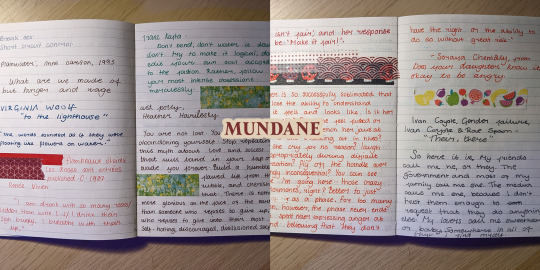
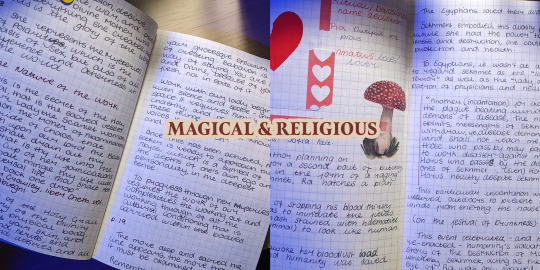
More reading on Commonplace books
https://en.wikipedia.org/wiki/Commonplace_book - The wiki page for Commonplace books that delves into their general & regional history, along with more variations on memory/infokeeping under See Also
https://notebookofghosts.com/2018/02/25/a-brief-guide-to-keeping-a-commonplace-book/ - A brief history & how-to on commonplace books, along with notable people that kept one.
https://bookriot.com/commonplace-book/ - An informal look at commonplace books, including using a tumblr blog/other digital formats as a commonplace book.
https://medium.com/thrive-global/how-and-why-to-keep-a-commonplace-book-ea80e25b63f1 - Information about commonplace books, alternatives to notebooks, and a small guide.
#witchblr#commonplace books#witchbook#book of shadows#grimoire#there are many uses for notebooks#magical recordkeeping#witchtips#witchcraft#recordkeeping
371 notes
·
View notes
Text
Herbalism Is Dangerous & "This Is Not Medical Advice" Will Not Save You
There is a vast difference between (A) Writing up a Monograph or a summary of your own research on an Herb that mentions its traditional Folk Medicinal uses for particular conditions ... (B) Writing about your own personal experiences using x herbs to treat your own conditions that you have ... (C) Giving out a plaintext Herbal Remedy (whether traditional, from a modern book / blog, or even self created) ... (D) Making and selling Remedies ... (E) And outright making a post stating that if you have x conditions, then x herbs are good for those conditions, and explicitly encouraging people to use them in those capacities for those conditions.
The former two (A and B) are not a form of Medical Advice; the first (A) is just a profile or summary of a plant and its variety and spectrum of historical uses that you've researched. The second (B) is just a record of your own personal experience with a plant ... When done correctly, three and four (C and D) is just giving out a recipe or a product- and both have to be done in a very specific way ... However? No matter how much you preface it with "this is not medical advice and I am not a Doctor", the later (E) is and remains a form of Medical Advice and always will be.
Some of y'all newer people getting into Herbalism desperately need to learn the laws and how to properly stay in your lane to avoid stepping over that boundary. Because saying "this is not medical advice and I am not a Doctor" does not actually give you a free pass to say whatever you want about Herbs and Herbalism. Because you can get in a lot of trouble for it, and this will not hold up in court when you do get dinged if you are not careful.
Furthermore: You can (and will) actively kill people with this stuff by (1) Using bad resources to educate yourself (especially since AI generated resources are increasing yearly); (2) Not preparing your remedies correctly (with proper sterilization, proper storage, etc); (3) Not knowing anything about the history of the people you are giving advice to; (4) Not being specific enough in the advice or recipes that you give (such as specifying alcohol types, or using proper Botanical Names and Terminology, etc); (5) Generally just not being well enough trained to be handing any kind of advice out in the first place; and so on and so forth.
There are a lot of ways that Herbalism can go very, very, very wrong- and those chances increase tenfold whenever you start giving things out to other people. And this is not a fearmongering "if", or a slippery slope ... This is an absolutely guaranteed outcome of doing the wrong thing incorrectly in Herbalism.
Well meaning people have absolutely killed many people through poorly or improperly practiced Herbalism. And often those people are the Disabled and Chronically Ill who've been left behind by the system to begin with. And sadly, in a disturbingly large number of other cases, many have also killed their own children- and often themselves- through such improper practice.
I am literally begging you: Do not add yourself, or another person, to those statistics.
For those getting into Herbalism because of practices such as GreenCraft especially, I cannot stress enough that this is not simple "Fuck Around And Find Out" territory like the rest of magic and the occult is ... This is 100% "Fuck Around and Potentially Die" territory and it must be taken seriously as such.
No matter how easy materials make it seem, I really, desperately, need people who have no actual training (with a school) and are just getting into it (often as a hobby) to understand that you cannot just fuck around with Herbalism willy-nilly; to understand just how legitimately dangerous this can actually be.
This is based on research, in addition to 15+ years of experience as a Lay Herbalist, and 20+ years of experience as a magical practitioner. If you found this helpful or interesting, please consider Tipping or Leaving a Ko-Fi (being Disabled, even $1 helps); you can see my other "Original Content" here.
#rosalyngray#bruxazgord#Original Content#Original Herbal Content#Herbalism#2023#Verderer#Oklahoma#Green Witch#Green Witchcraft#Witchy Gardening#Witches Garden#Witch's Garden#Gardening#Gardenblr#Plantblr
35 notes
·
View notes
Text
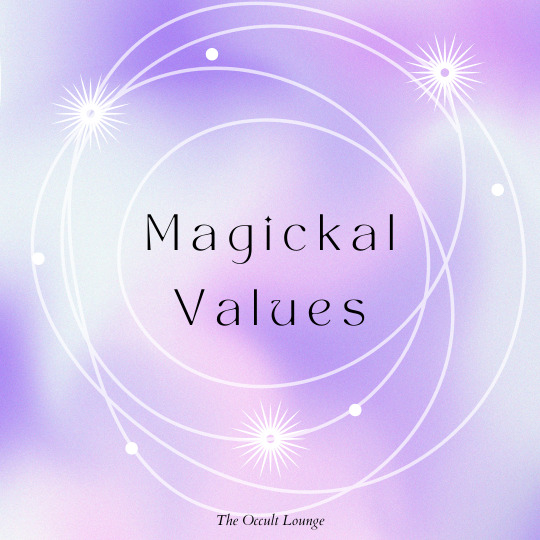
⚝ Responsibility ⚝
》 Many types of witchcraft and magickal practices tend to push the ideas of some sort of ethical law. In wicca there is the rede of 'harm none do as thou will'. There is the ideology of the three-fold rule, what ever you put out returns three times as worse or better unto you. There is the idea of karama, that you will recieve a retribution for the acts that you perform. You can choose to believe any of these things or deny that they exist, however practitioners must take responsibility for the energy that they use when performing magick. The world is full of balance, you may do baneful workings and see no issues in your own life but be fully aware that these workings may be causing issues elsewhere, not just the intended target. Claiming responsibility for your energy, the energy you manifest, the spirits and the Deities that are with you is a must when stepping into magickal practices. The spells that you perform may or may not rebound to you, so knowing what you did and how to correct it if need arises is a lesson of its own making.
⚝ Respect ⚝
》 In all of your practice there should be respect for everything you use, call upon, or seek help from. Do not disrespect powers that are older than you such as the elements, deities, herbs, animals, etc. Try to approach older practitioners with respect as well, for they have walked the path that you currently travel. Their words are guidance, they do not wish to scare you or make you feel as though something cannot be done. Older practitioners want to help and aide new practitioners so that they don't have to find things out the hard way. If you disrespect the greater powers or older practitioners be weary of what may come your way and be ready to give tidings to offer apologies for the things you may have done.
⚝ Intuition and Intent ⚝
》 Foundational knowledge is key to making magick happen. Understanding history, symbolism, traditions, correspondences, and how ingredients come together creates a well rounded practice. If intent was the end all be all anyone could wake up and be a powerful practitioner without even having learned a single thing about magick. Your gut, intuition, is a big part of creating your practice but it should not be all that you rely on. It is called a practice for a reason, it takes time, information, and education. There are those with natural gifts however if they are not expanded upon or repetitively practices they will never grow to their full potential. Do not make the mistake of thinking your intent and intuition are all that is required. However, do learn to trust your intuition in certain cases. If you are getting the overwhelming sensation to not do something, then don't do it. If something doesn't feel right explore that feeling and uncover the reasoning. Never fully ignore your gut but also there are times when you need not fully rely on it either, you must find this balance.
⚝ Patience ⚝
》 If you rush your learning there will be mistakes. If you rush your spells there will be backfire. Take your time and plan things out. Do not give in to the ideology that it has to be done quickly. Quickness leads to sloppy and ineffective work. By not following wppropriate steps in learning you put yourself at risk to encounter something you cannot defend yourself from. By speeding through a spell you do not give it the energy or focus needed to make it potent and feasible. You will end up in a situation that you may not be able to fix if you rush learning and spell crafting. Do not allow set backs to deter you from your craft. Set backs are just lessons in disguise. Learn from them, rework your practice and move on.
⚝ Perfectionism ⚝
》 You are human, to be so is to be imperfect. Striving for perfection in your practice is admirable but do not become perturbed when things are not perfect. Mistakes become lessons on how to better perform our magickal workings. Write down each working and analyze what went well and what did not, as well as the outcome. This will help you to create a better spell or practice. Don't worry about doing something grand in your practice each day, becoming to focused on your craft can lead to an embalance within your life, whice is NOT healthy. If you feel you need to do something magickal related everyday do the small things: stirring tea or coffee with intent, adding herbs to meals to herb boost a, b and c, meditation for 10 mins a day, standing in sunlight for a few minutes, all these things can be simple magickal practices to incorporate into your daily routine.
⚝ Practice ⚝
》 Magick does not just happen. You do not will things into being or spell things into suddenly appearing. Magick is a practice, as in a continuous routine within your life to make things better along side the aid of modernity and medicine. Magick does not replace the science that we have today. It is in junction with these things that magick can make a person's life fuller and more rewarding. Do not go into the idea of magick as it will give you what you want and need immediately. There is no magic pill only a magickal practice to be built on and used to tune your life to thw frequency that you need it to be at to be happy and healthy.
⚝ Individualization ⚝
》 Do not try to mirror the journey that someone else has taken. This is your practice, your journey, make it unique to you. Remember that what works for one may not work for someone else. Your beliefs and experiences should be what mold your craft and practice, don't let the experiences of someone else try to force you into a mold. Also, your path can be an amalgamation of traditions. Do not think for a moment that you must follow a map that is predetermined. Be open to learning all the traditions and information that you can and use what bits that you find to fit within your practice. You do not have to be just an herbalist or just a diviner, you are more than just one aspect of magick. You create your practice. Make it what you need it to be and if later in life it needs adjusting that is okay as well.
⚝ Mindfulness ⚝
》 When you set a goal to manifest you must mindfully push forward to that goal each day. Small steps add up over time, however setting a goal and not making an effort to achieve said goal is passive manifestation and will take a very long time for the goal to come to fruition, if it at all. Be aware of the goals you set everyday and the things that you can do to reach those goals. Small steps lead to big rewards, but no steps leads to stagnation. You do not have to dive head first into making the things you are trying to manifest happen but manifestation takes an active participant to work. Do not sit back and hope that these things will happen, you are in control of your life and the outcomes within it. Be an active participant.
⚝ Economics ⚝
》 You do not need all the fancy tools, herbs, and books that are being pushed for sale in modern spiritual shops. A aimple notebook or file on your computer for your grimoire or book of shadows. A fallen stick that you have adorned with string from a tree that you have always admired as your wand. A butterknife as you athame. Be frugal in your purchases. It is ok to find things in nature, thrift stores, or dollar stores. Magick does not have to be expensive and extravagant to work. Often, it is the simplest spells and items that create true lasting magick. It is also good to know where the items you are purchasing come from. Ethical sourcing has become a large problem within the magickal community. The only way to achieve a better economy within our community is to hold ourselves accountable.
#occult#occultist#occultism#occult community#occultblr#pagan#paganism#pagan community#paganblr#witch#witches#witchcraft#witchcraft community#witchblr#spirituality#spiritualism#discord
21 notes
·
View notes
Note
do you have any recommendations for resources re: tarot
hmmmmm
okay so actually i have advice. don't read the literal meanings of the cards. like it can be helpful to know the intended meanings, the astrology, the numberology, and symbolism but ultimately a reading will be more accurate if you understand the tarot in your own personal way. a lot of practitioners recommend making your own personalized deck to start to understand this concept better (like, printing out a photo of a butterfly and taping it to the death card to represent death bc that symbolism hits better for you).
for example, the knight of swords was a card i associated with an ex of mine. now whenever it shows up in a reading, i can either interpret it as its literal meaning or as having something to do with the romantic partner of the person im reading. but that will ultimately depend on the message of the readings, which is up to you to interpret.
also some people use spreads. i personally find spreads pointless. you don't need them to be able to read. don't memorize them. the position of the card on the table means nothing unless it DOES mean something. but that's up to you to FEEL not formulate. so don't use spreads. unless, like, you personally vibe with them. i'm not a cop or your mom so you do you.
in terms of resources, don't bother with books unless you're looking for general history stuff or some scammer's take on the "the soul's feminine and powerful journey of the tarot" or whatever. here's what you're going to look up:
-the history of the specific deck you're using, who created it and for what reason
-occult symbology and associations
-alchemical symbology and associations
-basic classic art symbology (ie what poses mean, etc)
-astrology in general and astrology in its relationship to the tarot
BUT MOST IMPORTANTLY
-meanings of each suite
-numberology (but like numberology specific to tarot. you can take into account actual numberology but tarot has its own numberology. googling 'tarot numberology' should work)
those last two are literally just what tarot is and it's usually universal across any type of deck. for example, take five of rods. rods = fire = knowledge. five = conflict. the five of rods' literal meaning in traditional practice is either a conflict or fun challenge. so conflicts are caused by differing opinions or thoughts OR conflicts can be seen as fun brain challenges. so five of rods literally means what rods and five represent together.
finally, a note on reversals - don't read them when first starting out. reversals don't mean the opposite of the upright card a lot of the time and you'll just get confused when trying to remember them all. just read the cards like normal and then eventually start to understand what the reversals mean TO YOU.
also those pick a card tiktoks never work bc its all based on algorithm. find some on youtube though (like the hour long ones) and just listen to those readings even if you don't think their advice applies for you. hearing someone else's take on interpreted tarot can be pretty beneficial in seeing how you view it.
also practice tarot with friends when you can, it's fun. make them learn tarot too so you get readings sometime as well.
anyways hope this helps. my source is that i have been a tarot reader for 10 years now, i'm a student at a government-recognized occult temple (and technically completed my first year of ministry training but i'm prob not gonna continue to priesthood), and i have paying clients. have fun.
#random nate writterings lore dump: i'm a fucking witch babey#went to an ostara ritual this weekend and everything
16 notes
·
View notes
Text
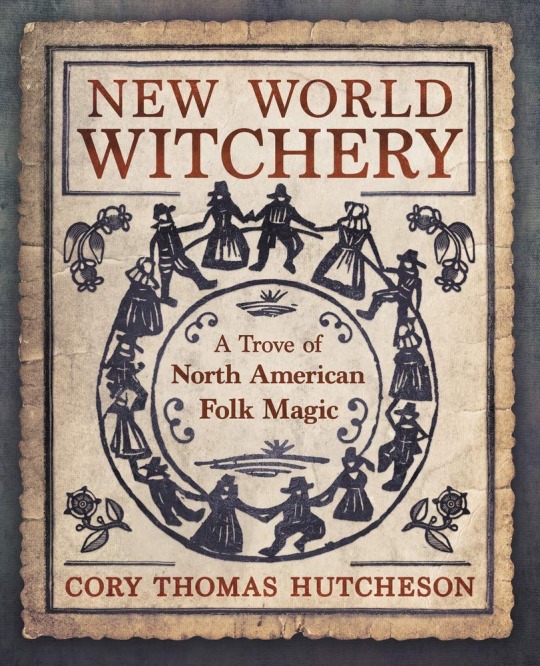
[Book Review] New World Witchery, by Cory Thomas Hutcheson
I’ve always enjoyed New World Witchery (the podcast). Here, Cory Hutcheson addresses some of the same subjects, plus more.
The title alone excites. So many works on folk magic focus on Europe and the British Isles. It’s great to see a shift in focus towards the traditions on the left of the Atlantic. It’s also much appreciated by us American witches!
North America’s magical traditions speak to the unique history of the continent. Hutcheson doesn’t shy away from the painful aspects of that history.
We’ve recently seen a (welcome) acknowledgement of colonialism’s psychic trauma. New World Witchery discusses this, and provides resources for further exploration.
This book does mention live animal sacrifice. It’s such a ubiquitous feature of ancient (and some modern) religions. I would’ve found the book incomplete without some mention of it.
The details on it that the author provides are appropriate. New World Witchery doesn’t give any how-to information for animal sacrifice, of course. Still, expect to learn a lot about its history in America.
This book mentions corpses (human) too. For millennia, locks of hair, bits of clothing, etc, have all connected sorcerers to their dearly departed. This book discusses the historical role corpses have played in North American magic. Hutcheson writes respectfully and with nuance, doing justice to this serious topic.
The author admits that magic can veer a person into strange situations. Hutcheson willing dives into the spooky stuff. This is fitting in a book about North American traditions, so many of which connect with local High Strangeness experiences. Mothman wants you to read this book, in other words. I asked him.
I love the author’s look at how secular North American holidays might relate to magical timing. The book also raises questions about the origins of magical materials, like gemstones. I would like to see this topic expounded upon by other authors - I think we, as a community, need to talk about this more.
There’s a lot of folklore in this book - spells, formulas, charms, leaving me with quite the appetite for it. I realize that much more would’ve made the book massive, though. Hutcheson provides ample sources for further reading.
The author’s treatment of recent New World occult phenomena interests me most of all. The book includes instructions for a classic creepypasta game hailing from online haunts. This brought me fond memories of life online in the illustrious mid-2000s. As online occult spaces become increasingly relevant, I love seeing authors address it. This book’s a gem.
Some will question the author’s choice to include a chapter on the Satanic Panic. I find it apt, timely, and important. We currently see the resurgence of a new such fear outbreak, spurred by the likes of Qanon and Pizzagate. Hutcheson shows how modern conspiracy theories often copy older blood libel legends. Not a fun thing to read about, but definitely important!
This is more than a collection of folktales and rituals from the Americas. New World Witchery gives us a vivid, dynamic picture of America’s psychic landscape. I give this book five out of five stars. It’s available from most online book retailers, and I highly recommend it!
#witch#witchcraft#magic#pagan#witchblr#eliza.txt#eliza reads#occult#book review#NetGalley#new world Witchery#folk magic#folklore#North America#animism
303 notes
·
View notes
Note
I know you've likely got this ask before, but what does "folkish" mean? (Sorry)
It's all good. It's a term that's not very well-known outside of certain populations, but it should be, so this is an opportunity to help with that. There's more to it than just defining it, as it has a particular history that I'm deliberately invoking when I use it. This is more info than you need but there are probably others who don't know it either so I might as well long-form it.
The word folkish is an English equivalent of the German völkisch (Wikipedia link), used by racist Norse/Germanic neopagans who simultaneously want to avoid saying völkisch and giving themselves away as ideologically connected to Nazi Germany, and can't help blurting it out anyway. Nicholas Goodrick-Clarke, a historian and expert on Nazi occultism, described it as referring to a "national collectivity inspired by a common creative energy, feelings and sense of individuality. These metaphysical qualities were supposed to define the unique cultural essence of the German people."
An oversimplified summary off the top of my head would be something like that it's a belief that race/ethnicity exists implicitly (i.e. not as a sociohistorical construct); that there is a 1:1 relationship between ethnicity and genetic ancestry; that there is a metaphysical aspect to race ("folk soul" or similar) expressed in the customs and traditions of that race; that preservation and advancement of the race is the mission of all of its members; and that the Aryan race is the highest and must consolidate and purify itself to "reclaim" its position at the top of the hierarchy through war, subjugation, and reproduction. These things are, especially when taken together, totally incoherent, and antisemitic conspiracy theory plays an important role in maintaining this belief system by providing a buffer between it and reality. Folkish people strategically keep some of these points quiet sometimes.
The idea of pre-Christian religion is important to folkish people whether they are pagan or not themselves because it's seen as a "pure" expression of the folk identity. Modern heathenry developed out of this constellation of beliefs and it forms the ideology of groups like the Asatru Folk Assembly.
Within paganism the most salient feature of folkism is the belief that all religious traditions that are identifiable with a specific cultural-ethnic group should only be practiced by people whose genetic ancestry is traceable back to that group. I.e., only white North European-descended people get to be Norse pagans, only Greek-descended people get to be Hellenists, etc.
Some people use it synonymously with "racist pagan" or "Nazi pagan" but while these are overlapping categories I tend to say "folkish" or "völkisch" when it's appropriate because there are many kinds of racism that aren't folkish, and very many folkish people are not full-blown Nazis (which is not a defense of them, there are many forms of scumbag that aren't Nazis). Folkism is a particular constellation of racist ideas that is especially relevant to pagans, especially Norse pagans, and it's necessary to be able to identify its influence in modern pagan ideas; likewise it's necessary to be able to identify racism in paganism that isn't folkism and conflating the two terms makes it harder to do that. I put "folkish fuck off" in my bio because writing "racists fuck off" doesn't tell anyone anything; a folkish person will see that and go "oh yeah that's not for me, I'm not racist, it's not racist to secure the existence of our people and a future for white children." But if I say "folkish" they know who I'm talking to and what I'm about.
For decades "folkish" heathenry was contrasted with so-called "universalist" heathenry (in this context meaning that anyone can join) but the term "universalist" has been phasing out of use because it already means something totally different in religion and philosophy and "inclusive heathenry" is the more common term now.
For in-depth reading, Nicholas Goodrick-Clarke's The Occult Roots of Nazism and Black Sun: Aryan Cults, Esoteric Nazism, and the Politics of Identity are good reads on the broad subject of völkisch ideas; Stefanie von Snurbein and Jennifer Snook are authors who have written about it within the context of modern heathenry.
105 notes
·
View notes
Note
For your ask game: 1, 12, 17, and 20 :D
Thought you’d be the first to ask 🤣
1) traditional witchcraft; which I understand as an umbrella term encompassing witchcraft that is based on lore/history, a cultural or hereditary tradition and/or witchcraft who’s roots lay in the trads founded by the likes of Chumbley, Cochrane, Williamson etc. more specifically my craft is a blend of my local (new england) lore/magic, the lore of where my family are from (primarily France and the parts UK) Catholicism and cultus sabatti.
As far as religion goes first and foremost I’m an animist. Catholicism plays a large role in my magic and ancestral veneration but I wouldn’t necessarily consider myself a catholic. I’m a budding gaulpol, this is very very new to me however.
12) How easy it is to connect with others! There’s basically no occult community where I am so it’s very very nice to be able to interact with folks online and see things I’ve never thought of!
17) moose, heron, deer and goose!
20) astrology! Especially fixed stars and their practical magical application.
#ask game#asks#traditional witchcraft#magic#animism#tradcraft#occult#folk magic#magick#witch#witchcraft#folklore#traditional craft
6 notes
·
View notes
Text
Lilith as "the mother of all woman?" | Demystifying.
Note: this post is not intended to encourage or discourage the worship of Lilith, but rather to bring reflections based on historical and mythological analyses about themes that have been and continue to be extremely distorted.
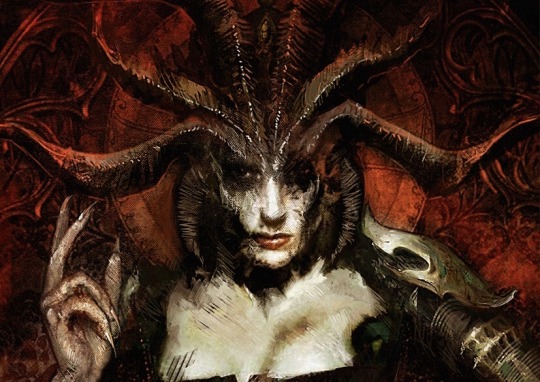
(att by Murat Gül)
This is a subject that has sparked extensive discussions in occultism circle for a long time. Certainly, Lilith strongly embodies the definition of Woman Contrary/Opponent to the reigning Abrahamic patriarchal system. But when we talk about Lilith, we talk about a history with deep roots.
We can't say that the image of Lilith was derived from a single entity, but from from different ancient concepts, which I will branch out into a few different lines. Commonly found in Jewish myths (midrash and folklore) the origins of Lilith is dated as a Sumerian Succubus. Then the image of Lilith was presented on the Alphabet of Ben Sirah (a compilation of two lists of proverbs, 22 in Jewish Babylonian Aramaic and 22 in Medieval Hebrew), seen as a demoness instead of the "first Eve".
Look at the history:
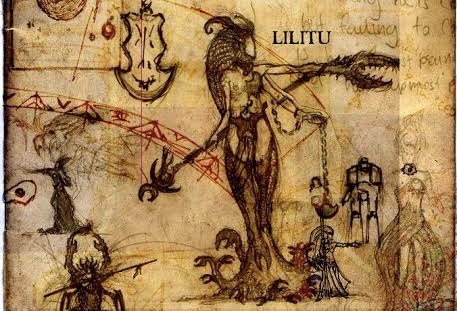
(unknown artist)
1- Lilitu in Mesopotamia:
The Semitic root "LYL" translates to "Nocturnal". Derivatives also include "Lalu": the wanderer; "Lulu": Wanton/Luxurious.
Lilitu was a formless adjective used in Mesopotamia to refer to female entities of the night. She was designated as the Queen of the Lilu, vampiric entities that invaded men's erotic dreams to steal their semen. Thus giving birth to the "Lilins" = man-devouring abominations.
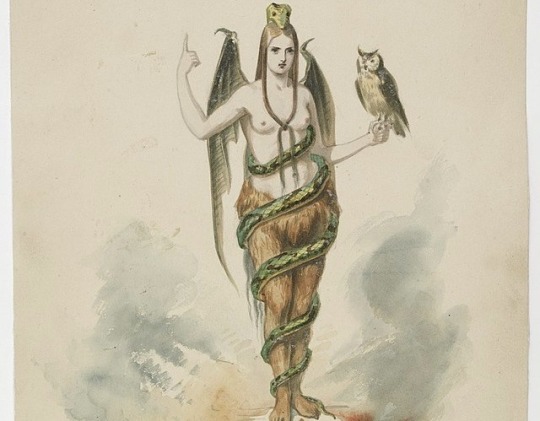
(art by: P. Lormier 1848)
2- Ardat Lilith
"Ardat" is a term originally related to "prostitutes" and also "impure women".
In Mesopotamia, Ardat Lili becomes a Semi-Goddess. Thirsty for blood, sinful and associated with diseases and darkness.
Ardat Lilith was known as "unable to produce milk" and "the woman without husbands", "reaper of men".
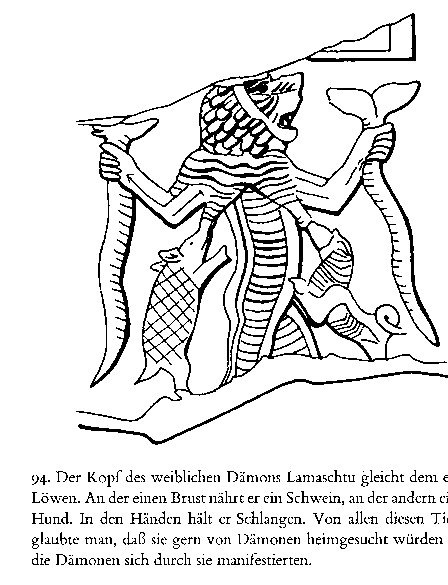
3- Lamashtu
Another entity rooted in Lilith's foundations, she was the daughter of the Gods of the Heavens. Often depicted with grotesque figures and portrayed with a lion's head, donkey's body, bird's talons, and dry breasts.
Feared by pregnant women, she was known to invade family homes and bind newborns, or even devour them. Lamasthu was also recognised for her abilities to fly and her knowledge of natural elements.
Pazuzu was often invoked as a protector against Lamasthu's forces, to prevent her from her bloody deeds.
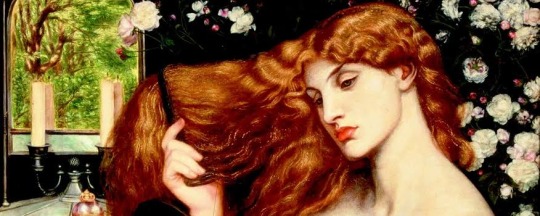
(Art by Dante Gabriel Rossetti, Lady Lilith (1866-1868), Delaware Art Museum)
Frequent confusion:
Confusion between the concepts of Lilith and Ishtar is frequent, where Lilith is sometimes mistakenly equated with a kind of "dark aspect of Ishtar." While Ishtar is revered as the goddess of procreation, fertility, love, and sexuality, some modern interpretations blur these deities, attributing to Lilith - a Vampiric entity, qualities with erroneous concepts such as fertility in a very humane concept: "mother goddess of women," etc. Well, she is indeed, the mother of aberrations and demons in certain mythological and religious traditions, especially in Jewish folklore and Kabbalistic teachings.
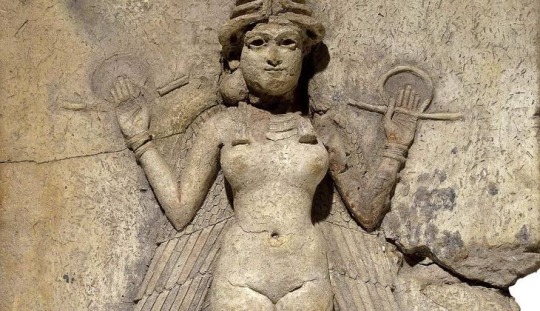
(Old Babylonian, 1800-1750 BC. From southern Iraq. (British Museum, London)
The mythological figure of Ishtar dates back to ancient Mesopotamia, where she was worshipped by cultures such as the Sumerians, Akkadians, and Babylonians. Her divinity encompassed both positive and negative aspects of existence, reflecting her influence over fertility, love, war, and sexuality.
The confusion between Lilith and Ishtar can be partially attributed to the attempt to correlate these deities, often due to their association with femininity and their duality of characteristics. However, it is crucial to emphasize that these contemporary correlations should be approached with caution, recognizing the intrinsic nuances of the specific mythologies from which they emerge.
The challenge, furthermore, lies in the diversity of perspectives regarding Lilith. While some interpretations categorize her as a negative polarity and Demonic figure, others see her as a symbol of female autonomy and resistance. These differences in interpretation can be attributed to the various cultural and religious traditions that have influenced the evolution of Lilith's image over time.
This text aims to clarify, in an objective manner, the underlying complexity of the figure of Lilith, recognizing the multiplicity of historical and contemporary interpretations that have shaped her representation. The approach seeks to avoid oversimplifications and provide a more comprehensive and informed understanding of Lilith's role in the mythologies and cultures in which she is embedded.
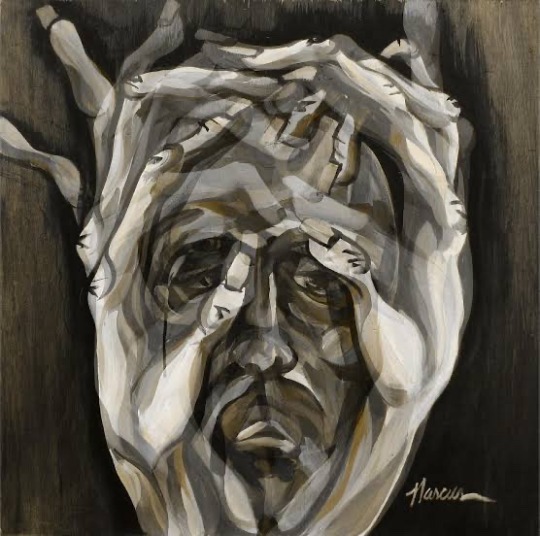
(art by: Marcus Ortega)
I often perceive levels of resentment within the occultism community when this type of content is brought into the historical/ academic sphere, leading to rejection and sometimes unpleasant discussions.
It is of utmost importance, however, to emphasize that bringing content grounded in history about certain entities/goddesses rooted in something many of us oppose - Abrahamic influence and their demiurgic false god; does not imply support or endorsement of this kind of belief.
Dealing with complex subjects requires a certain level of maturity, and relying solely on “voices in one's head" leads us into the realm of fallacies.
Lilith and feminism?

During the fight for freedom and gender roles during the 60s, Lilith became a "feminist" icon representing rebellion and liberation.
The feminist movement saw interested parties in society take a second look at Lilith’s story. Claiming that she was unfairly demonised by abrahamic creeds and Sumerian mythology. Especially for her refusal to submit to Adam (Jewish Mythology). I see indeed a kind of beauty and strength in the philosophical concept.
Note: Feminism = equity and equality; not supremacy. And Lilith...wel, at this point you should know.
But were it comes the part were everything becomes a big mess:
With the expansion of "religions" and whitewashed beliefs rooted in New Age movements, many have lost their minds, and consequently, some leaven of logical reasoning. And I like to emphasize how the pursuit of knowledge becomes crucial in ancestral practices and historical concepts.
Conclusion?
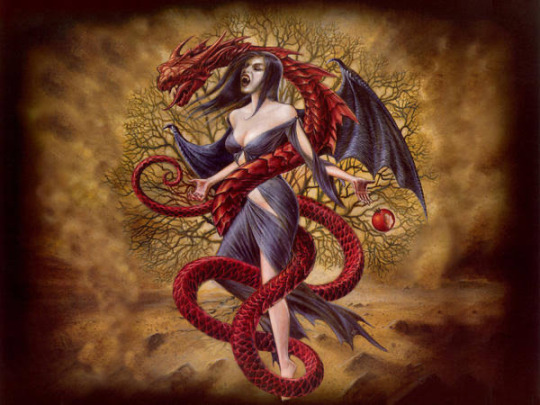
(art by: Lord-Scandamour)
Through historical and mythological analyses, it is highly inconceivable to correlate an Lilith as our mother; or a entity devoid of a humane concepts of empathy with the human race, neither human broken concept of love understood by us. Likewise, attributing her as a mother goddess or as I frequently see some peoples affirming they're: "Lilith's daughter" makes no sense (unless you are a demon who climbed the "infernal" mountains to reach the Earth - but let's set aside these schizophrenic concepts). It is important to face reality, especially when dealing with mythological/historical/ancestral cults. Without any lens that embrace interpretations based in fantasy.
Lilith is, indeed, a Vampiric Demon and have always been, she does represents the Dark Feminine, and various aspects of the feminine and rebellion. There isn't a universally standardised way or form of worshiping Lilith, and I am not claiming so. I carry a lot of respect with this force and strong energy, and just find necessary to spread knowledge and informations.
Isheth Zenunim Taninsam Ama Lilith, Liftoach Kilt
<Copyrights>
List of contents for a very diverse research (some still on my readings list/wishlist):
The Alphabet of Ben Sira": This medieval Hebrew text is a primary source for the Lilith myth. It describes Lilith as the first wife of Adam and the mother of demons.
"The Encyclopedia of Demons and Demonology" by Rosemary Ellen Guiley: This book provides an overview of various demons and mythological figures, including Lilith. It may offer insights into Lilith's role as a mother of demons.
"Lilith, Queen of the Night" by Steve Savedow: This book delves into the various aspects of Lilith in mythology and folklore, including her association with demons.
"The Lilith Monographs" by B. Morlan: This series of monographs explores Lilith in depth, and some of them touch upon her role as a mother of demons.
“Devils and Evil Spirits of Babilonia Vol. I” Reginald Campbell Thompson
Lilith: Dark Feminine Archetype" by Desda Zuckerman: Desda Zuckerman explores Lilith as a dark feminine archetype in this book, drawing on both historical and esoteric perspectives.
"Lilith: Healing the Wild" by Tom Jacobs: This book combines mythology, astrology, and psychological insights to explore Lilith and her role in personal and collective healing
The Book of Lilith" by Barbara Black Koltuv: Koltuv provides an in-depth exploration of Lilith from a Jungian psychological perspective, incorporating mythology, dreams, and symbolism.
The Satanic Bible" by Anton LaVey: Anton LaVey, the founder of the Church of Satan, includes references to Lilith in "The Satanic Bible." In the book, she is mentioned as a symbol of female independence and strength. However, it's crucial to understand that LaVeyan Satanism is atheistic and symbolic, viewing Satan as a symbol of individualism and rebellion rather than a deity.
"Lilith: Goddess of Sitra Ahra" by Daemon Barzai: This book explores Lilith within the context of Sitra Ahra, which is considered the "Other Side" or the Qliphoth in some forms of Western occultism. The Qliphoth is a concept within Kabbalistic mysticism, and some practitioners of the Left-Hand Path incorporate Lilith into their esoteric practices.
6 notes
·
View notes
Text
On Feb 18th, we venerate Elevated Ancestor Dr. Chloe A.W. Morrison aka Toni Morrison on her 93rd birthday 🎉
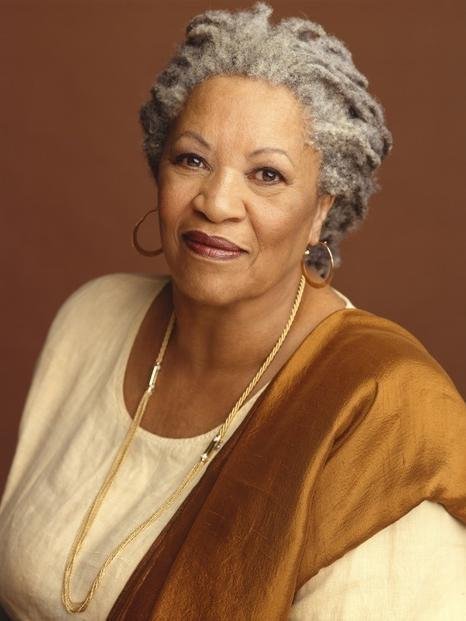
A master wordsmith & storyteller, college professor, powerhouse editor, Queen Mother Morrison is honored as the first Black Woman winner of the Nobel Prize in Literature, a Pulitzer Prize in Fiction Lit, & the recipient of President Barack Obama's Medal of Freedom. Yet above all the accolades and awards, she asserted that none was more worthy of her honor than her work in "deconstructing the master narrative"; that is, unapologetically centering her work in expressing the every day realities, history, & legacies of Black People by/for Black People - instead of black people only, sort of, existing as a backdrop in relation to White people.
She so affectionately & proudly expressed ancestral wisdom & knowledge that could be found throughout her literary works. Occultism, magic, Folklore, oral tradition, Paranormal, biblical allusions, & Catholicism were themes that were frequently immersed into her stories yet were mirrored reflections of her lived experiences and those of others. She lived in her occultic truth as a thriving product Dreamers, dream interpreters, mediums, Seers, etc. Through her work, their stories and those so frequently shared among our people - often casted out as anything but godly or good - live on forever.
"We die. That may be the meaning of life. But we do language. That may be the measure of our lives." - Dr. Toni Morrison during her 1993 Nobel lecture.
We pour libations & give extra 💐 to honor Toni Morrison on this day for being a voice of our Ancestors, for her creative vision that'll inspire us for generations, & for her love of our people x our power. May be continue to be a beacon & a blueprint for those, like me, who take up the mantle of speaking our occultic ancestral through the art of storytelling & wordsmithing.
Offering Suggestions: libations of water, flowers, & reading/sharing her literary work.
‼️Note: offering suggestions are just that & strictly for veneration purposes only. Never attempt to conjure up any spirit or entity without proper divination/Mediumship counsel.‼️
21 notes
·
View notes
Text
Resource List
List of freely-available online sources only, some of which are translated into English. Will be updated sporadically.
Last update: Nov 26, 2022.
GENERAL (English)
A Chinese Bestiary by Richard E. Strassberg
A nice if incomplete translation of the Classics of Mountains and Seas (Shanhaijing) that focuses on the creatures. It goes into considerable detail and background, unlike Anne Birell’s direct translation. It does not, however, translate the numerous sections listing mountains with no creatures.
The Nine Songs translation by Arthur Waley (Available on the Internet Archive)
A translation of the Nine Songs from the Songs of Chu.
Six Chinese Classics translation by A. Charles Muller
Consists of Analects of Confucius, Great Learning, Doctrine of the Mean, Mencius, Daode jing and Zhuangzi (Chapters One and Two)
Book of Poetry translation by James Legge
300 Tang Poems (Available online) (Alternate link)
“Sui-Tang Chang'an” by Xiong Cunrui
An unbelievable resource for anyone seeking information on the Chang’an city during the Sui and Tang dynasties. It has maps and fully listed names of all the wards and Imperial City interior buildings, and even a compiled list of known inhabitants of the city as well as which wards they were reportedly living in.
Brill Chinese Reference Library: Title of Officials translation by Michael Loewe
Translation of titles from the Hanshu, I believe.
The T'ang Code, Volume I: General Principles translated by Wallace Johnson
The T’ang Code, volume 2, Specific Articles translated by Wallace Johnson
Tang dynasty law code. Can probably also double as “tag yourself” meme if you want.
“Epidemic and population patterns in the Chinese Empire (243 B.C.E. to 1911 C.E.)” by A. Morabia
The Ideology of the Guqin
USEFUL SITES
cbaigui.com
A wonderful site compiling bestiary entries from many ancient Chinese texts, including but not limited to Diagrams of Bai Ze, Old Book of Tang, Book of Rites, etc. You can search them sorted by book or by dynasties, which is a feature I never knew I needed until I saw it.
ctext.org
We know it, we love it, the MVP that compiles so many of ancient texts, and some of them have translations (by James Legge) too.
In Conversation with China Youtube Channel
Collection of online talks/lectures on various topics, including Classic Chinese grammar, Dunhuang Cave Manuscripts, etc. Personal biases, but some of my favorites are the ones by Sarah Allan, Donald Harper, and the series that explores the definition, perception, and treatment towards those with disabilities in early China.
Wikisource 古文 Category
I really just stumbled upon this looking for 白泽精怪图 but it has a number of misc texts in Traditional Chinese.
chinaknowledge.de
Another classic. It’s an incredible site for anyone looking to jump into a specific topic; you can pick up from there.
100jia.net
It’s kind of a headache to navigate it at the start but the link provided should send you to a page with a long list of ancient Chinese classic texts as well as several existing online translations of them. It’s in German, yes, don’t mind it.
Resources on Chinese Legal Tradition
TANG DYNASTY SPECIFIC
"The Reconstruction of Yongning Ward" by Heng Chye Kiang and Chen Shuanglin
Details a theoretical and digital reconstruction of a particular ward of Chang’an during Tang dynasty, including population estimate.
The administrative divisions of the Tang dynasty
唐朝官员品级 Tang dynasty official positions ordered by rank
中国俸禄制度史 The history of China's salary system
CREATURES, FOLK RELIGION, ETC
"The Textual Form of Knowledge: Occult Miscellanies in Ancient and Medieval Chinese Manuscripts, 4th Century BCE to 10th Century CE" by Donald Harper
I’m not even gonna try to describe it right now you can figure it out by reading the title
Ho Peng Yoke books on Archive.org
Includes "Chinese Mathematical Astrology: Reaching out for the stars" and "Explorations in Daoism Medicine and Alchemy in Literature".
龙是如何进化的:龙纹史考 by 陈涤
A post that chronicles the development and changes to the form of the dragon across dynasties.
龙头鹿身的就是麒麟?都弄错了!麒麟的秘密大公开! by 天可汗文化
A post that chronicles the development and changes to the form of the qilin across dynasties.
“Bai Ze special” by 哀吾生之須臾
白泽特辑【一】「白泽」的传说
白泽特辑【二】「白泽」的形貌
白泽特辑【三】「白泽图」的相关概况
Bai Ze, Ephemera and Popular Culture by Donald Harper (paper available on the Methods on Sinology site, but site is under construction)
白泽志怪 by 白泽君
One man’s attempt to piece together Diagrams of Bai Ze and explore Bai Ze as a myth. This particular post attempts to put together the surviving entries of the lost text.
37 notes
·
View notes
Note
what are some books/literature that have helped you develop your own personal style of luciferian magick?
Hello! Thanks for the question. I don't have a formal reading list yet, so this might get a little rambling as I explain how different works have influenced different parts of my magical practice.
You may already know, given how open I am about not having an interest in specifically Luciferian Grimoires, but my personal style of Luciferian magic is more accurately magic I do as a Luciferian. While it involves the three pillars of my practice (Lucifer, Azazel, and Eve) it does so in a way I suspect many eclectic practitioners could involve their own deities and/or major spirits.
I'll also be the first to admit that I don't consider myself a very advanced practitioner. I've been rebuilding my religious and magical practice from the ground up over these past few years, and while I can speak with some confidence about the things I have studied at length, I sometimes wonder if knowing when to speak on what I know and when to stay silent on what I don't gives me the illusion of knowing far more than I do. Still, I'm happy to share some of what I've drawn from so far.
My magical interests and inspirations have so far mostly come from folk magic and ceremonial magic. While I'd like to add some elements of chaos magic into my methodology after some cursory research into it and a very interesting discussion with a friend of mine about how certain aspects of it can be combined with folk magic practices, I haven't yet delved into it.
For the folk magic and animism side of my practice, the writing of Sarah Anne Lawless was very formative. Though her blog has long since been taken offline, it can still be read in internet archives. I also tried to read up on British styles of traditional witchcraft and folk magic (not to be confused with BTW Wicca). I'm sure no one will be surprised to learn that Troy Books was an early source for that. Things like Cecil Williamson’s Book of Witchcraft and Spells from the Wise Woman's Cottage provide a nice glimpse into the gathered history of traditional witchcraft and magic that the Museum of Witchcraft and Magic has gathered. I also read a few of Gemma Gary's books; though they didn't add much to my own practice, I do enjoy reading books from other practitioners' perspectives, and I know many people who've found them valuable.
From there I've been trying to read up on folklore and folk practices where I can. I don't really have a formal reading list since my backlog is pretty intense, and I'm hesitant to recommend books I haven't read all the way through. I also try to use my best judgement to build off of ideas I've encountered elsewhere, and localize the parts of my practice that have to do with flora and fauna. It's why lists of colour or plant correspondences aren't really helpful... different allies will be found in different areas, and cultural associations with these things can matter.
The ceremonial element of my practice has been to very carefully pick apart grimoire magic and see what I want to apply to my work. So far it's mostly used to help me mull over the crafting of tools, and to apply planetary hours and correspondences to my spellwork and the making of talismans, incense, oil, etc. Texts like the Greater and Lesser Key of Solomon, Agrippa's Three Books of Occult Philosophy, and Drawing Spirits into Crystals tend to be a given when making recommendations on ceremonial magic. Be warned that Western ceremonial magic as a whole can be a minefield of appropriated Jewish mysticism; my own research into it and deciding what I feel comfortable applying to my practice is seemingly never ending.
Finally there's just... working with my spirits and deities. I'm not sure I have a specific book or texts to suggest for this one, outside of how things like Paradise Lost or The Book of Enoch and the articles and papers on Ugartic and ancient Canaanite mythology have helped to build my understanding of them. The inspiration for the altar I'm working on is unquestionably inspired by Wicca, due to that being my entryway into magic and paganism in the first place, in the sense that understanding why a Wiccan altar is set up how it is helped me to then decide what I wanted and needed on my own. My offerings are influenced by planetary associations and folklore (Venusian incense for Lucifer, things relating to iron or Saturnian herbs for Azazel, etc) and things like candles, food offerings, and incense have become so second nature and obvious to me that I couldn't pinpoint for you which books helped establish that foundation for me. I will say I found writings about the Red Meal very interesting for some of the smaller rituals I have planned. If memory serves it was popularized by Robin Artisson, who I have some trouble blanket recommending due to past attitudes and actions, so this is one of those cases of "take what you need but read critically".
I want to give a special mention to learning divination. It's been the most valuable tool in my practice in recent days. I like to use a combination of tarot and futhark runes when I can. I'd recommend the Rider-Waite-Smith deck as a way to learn the symbolism that's been most widely used, and honestly an online resource like Biddy Tarot while you're first getting used to the meanings of the cards and want help understanding the images used and the meanings they carry. The Rider-Waite-Smith deck uses a lot of ideas and symbols from the Order of the Golden Dawn, so some can be less obvious to those not familiar with them if you're just staring at the cards. Information on Futhark runes is also very wide spread, though I'd avoid anything by Stephen Edred Flowers/Edred Thorsson, as he's frequently associates himself with Asatru flavoured white supremacist groups, and one of them currently has publishing rights to his books that use the Edred Thorsson pen name.
Since I didn't have anywhere else to put it, this is where I also shout out Paul Hudson's Mastering Witchcraft as one of those books a lot of people recommended when I was first starting out with magic, and Jackson Howard, Michael Howard, and Nigel Jackson's The Pillars of Tubal Cain as the book that got recommended to me a lot when people learned I was a Theistic Luciferian, including by other Luciferian authors.
Finally, I want to say that it's always good to go outside of purely occult books. They're often less expensive and very clear with where their information comes from. Articles, papers, and encyclopedias about herbalism and plant folklore, religious history, and so on, can be extremely valuable. For example, The Encyclopedia of Psychoactive Plants: Ethnopharmacology and Its Applications is both a fascinating read and has snippets of historical uses of these plants, such as an incense intended for divination made from acorns.
I hope this wall of text helped give some insight into my thought process and some of the books involve! Someday I might finally start a proper reading list, but sadly today is not yet that day...
59 notes
·
View notes
Note
I hope it’s ok to vent or ask for advice or just be kind of stressed right now but this might be so stupid idk can I be saved with tattoos? I’ve always been really artistic and before I knew Christ I just had a lot of friends who had them and it was just kind of the norm for me for a while so I got some again, mostly because I like designing etc and I have a church that couldn’t care less to be honest but every so often I go onto social media or come into constant with a Christian / Catholic or someone who says it’s disgusting or horrible like I don’t have random times where I HATE myself for it or whatever and ever time I remind myself and know belivers who have them I hear someone speak like this or say it’s a terrible sin etc etc and my heart drops and I want to cry and hide and I feel less than any other person in the church :(
If you want to become a Christian by having a valid baptism, you can have tattoos. Jesus never turned anyone away from sitting at His table. There is also nothing across any denomination that says if you want a valid Baptism you can’t have tattoos. Those people online that are coming at you claiming to be Christians themselves are not truly Christian at all. If someone wants to become a Christian, who are we to judge them, to shun them, and turn them away to the point where you cry and feel what you’re feeling now? Those people should be ashamed of themselves for what they’ve done by twisting the eternal word of our God to mock you. I want to apologize in their place for the way they treated you. It is through Baptism of living water that we are saved. You can be any color, male or female, race, ethnicity, age, disabled or non-disabled, rich or poor, job or no job, no matter what your past beliefs or current beliefs, no matter what clothing you wear or what ink you may have on your skin, etc. I think tattoos have a potential to be beautiful depending on what they are and why it was chosen. I wouldn’t turn you away. You have a place at His table if you want to be saved. I know this has been weighing heavily on your heart these past two days, so I want to be the one to extend my hand in peace to welcome you to knowing God.
— —- —— ——-
The tips I would obviously give and remind you of:
youtube
- remember that tattoos are permanent so be very sure on what that image will be. If you have any you regret, you can always cover them up with a new tattoo or laser it off but I hear laser is very painful. If money is an issue, there are other ways to cover up the unwanted tattoos by clothing and make up.
- if you feel a current tattoo may be sinful, bring it to our Lord in prayer. If you become Catholic in the future, you can bring it to Confession. All sins can be forgiven except blasphemy against the Holy Spirit. God isn’t going to turn you away or get mad at you, He loves you no matter what and is always by your side.
- absolutely avoid getting any tattoos with Satanic imagery, the occult, sins like lust and pornography, gore, cults, and other imagery like Nazi symbols, etc. you may also want to avoid getting tattoos in foreign languages unless you can absolutely be sure of what it says is correct.
- avoid tattoos of names of your current boyfriend or girlfriend or best friend. These people can come and go (unless you get married of course!).
- people forget that sometimes when you get surgery like my step father did, they actually had to do tiny tattoo dots on his skin.
- I’ve also seen a story of where these Christian women got tattoos in order to avoid being forcely convert them to Islam! Since they stood up for God and their faith, those tattoos literally saved their lives by the grace of God. You can read about that here:

- we also have evidence of Christian pilgrimages where you could get tattoos the old fashion way along the Holy Land and there is also a rich history! Like what BBC said:
youtube
Anddddd remember that I love you and God loves you.
youtube
10 notes
·
View notes